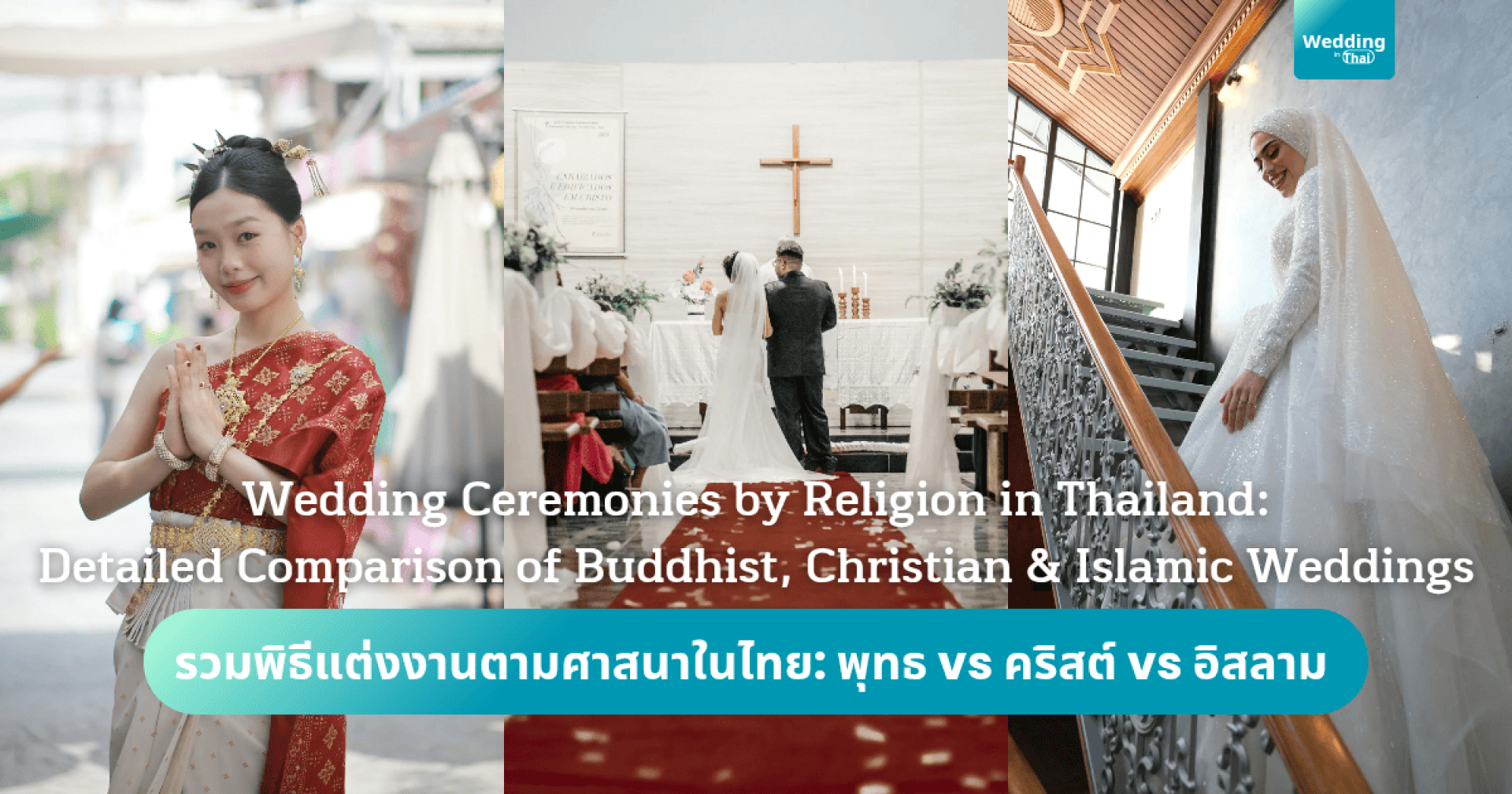Wedding Ceremonies by Religion in Thailand: Detailed Comparison of Buddhist, Christian & Islamic Weddings
Last updated: 5 Nov 2025
672 Views

Why Understanding Religious Weddings Matters
Weddings are a major life milestone and a union of families. In Thailand’s multi-faith society, organizing a wedding according to religious practices is important both spiritually and socially. Understanding the differences among Buddhist, Christian, and Islamic ceremonies helps planning, respects beliefs, and creates meaningful celebrations for the couple and families.
Quick Overview
- Buddhist weddings: Emphasis on merit-making, alms-giving, water blessing (rod nam sang), and monk blessings for auspicious beginnings.
- Christian weddings: Sacred vows exchanged before God, ring exchange, priestly blessing, often held in a church.
- Islamic weddings (Nikah): A religious contract witnessed by observers; includes mahr (dower), prayers, and often followed by a walima (celebration).
Buddhist Wedding
Buddhist-style weddings in Thailand focus on accumulating merit and receiving blessings from monks and elders. The ceremony blends religious rites with Thai traditional elements.
Typical Steps
- Morning merit-making and alms-giving: Monks receive offerings, creating an auspicious start.
- Engagement/ring ceremony (if applicable): Some couples hold a distinct engagement ceremony.
- Water blessing (rod nam sang): Elders pour sacred water over the couple’s hands and offer blessings.
- Monk chanting and blessings: Monks chant and give sermons or blessings.
- Respect to elders: Couple pays respects to parents and family elders.
- Reception: Feast and celebrations follow, often in the afternoon or evening.
Symbols & Meaning
- Sacred water: Purity and blessing.
- White thread (sai sin): Symbolic connection and protection.
- Merit-making: Intention to begin married life with spiritual grounding.
Tips for Planning
- Reserve the temple and confirm monk availability.
- Prepare ceremonial offerings.
- Plan seating and procession logistics for monks and elders.
Christian Wedding
In Christian theology, marriage is a sacred covenant before God. The ceremony centers on vows, scripture readings, and blessings from the clergy.
Variations (Catholic vs Protestant)
- Catholic: Often includes Mass elements and specific canonical requirements.
- Protestant: More flexible structure but with a strong focus on vows and scripture.
- Pre-marital counseling: Meetings with the pastor or priest.
- Procession: Bridal entrance to hymns or wedding march.
- Vows: Promises made in God’s presence.
- Ring exchange: Symbolic of eternal bond.
- Blessing & declaration: Pronouncement of marriage by clergy.
- Readings and hymns: Scripture passages and special music.
- Reception: Party with food, music, and celebration.
Symbols & Meaning
- Vows: Commitment and fidelity.
- Ring: Eternal, unbroken bond.
- Scripture & hymns: Spiritual foundation and guidance.
Tips for Planning
- Book the church and clergy early.
- Arrange music and readers.
- Coordinate with families regarding dress code and traditions.
Islamic Wedding (Nikah)
Nikah is a legitimate contract under Islamic law, emphasizing mutual consent, clear terms, and faith-based responsibilities.
Typical Steps
- Ijab & Qabul (Offer & Acceptance): Formal declaration of consent between parties.
- Nikah ceremony: Conducted before witnesses and an imam.
- Mahr (dower): Agreed-upon gift from groom to bride, a sign of responsibility.
- Dua & prayers: Seeking blessings for married life.
- Walima (celebration): Public feast to celebrate and inform the community.
Symbols & Meaning
- Mahr: Security and respect for the bride.
- Witnesses: Ensure transparency and validity.
- Walima: Public acknowledgement and communal sharing.
Cultural Variations
Local customs (e.g., Malay Muslim practices in southern Thailand) may add unique elements. Confirm local norms and consult religious leaders.
Tips for Planning
- Agree on mahr terms clearly.
- Find a qualified imam or officiant.
- Consider seating arrangements and gender-specific practices as needed.
Practical Planning Advice
- Begin early: Contact religious leaders and venues as soon as possible.
- Know the rules: Different faiths and denominations may have specific requirements.
- Communicate with families: Clarify expectations and traditions.
- Document needs: Some ceremonies require documents or witnesses.
- Consider interfaith logistics: When blending traditions, consult all religious advisors.
Etiquette & Common Considerations
- Dress respectfully per religious norms.
- Respect photography rules during sacred moments.
- Inform guests on ceremony type and dress code.
- For interfaith weddings, plan order of ceremonies and obtain approvals from religious authorities.
FAQ
Q1: Can interfaith weddings be done?
A1: Yes, but planning requires communication with both religious leaders and families to ensure rituals align with each faith’s requirements.
Q2: Are legal marriage procedures different from religious ceremonies?
A2: Yes. Religious rites may be separate from civil registration. Ensure legal registration is completed according to local law.
Q3: Which ceremony needs witnesses or specific documents?
A3: Islamic Nikah often requires witnesses and agreement on mahr. Civil marriage requires legal documents. Check with local authorities and religious institutions.
Each religious wedding traditionBuddhist, Christian, and Islamic offers unique rituals, deep meanings, and beautiful symbolism. Understanding these differences enables respectful, meaningful, and well-organized celebrations that honor faith, culture, and community. Whether the ceremony is a simple temple blessing, a church vow, or a Nikah with mahr, the essence remains the same: a solemn promise to walk together through life.
Tags :
Related Content
Discover the sequence of a traditional Thai wedding ceremony, from the Khan Mak procession to the Rod Nam Sang ritual and bridal room blessing—each step filled with deep cultural meaning.
7 Aug 2024
Preparation Before the Ceremony The couple announces their engagement in church, sharing their news with family and friends. They meet with the pastor
19 Dec 2024
The Islamic wedding ceremony, called "Nikah," is a deeply spiritual event and a religious contract between the groom and bride.
22 Jun 2024


